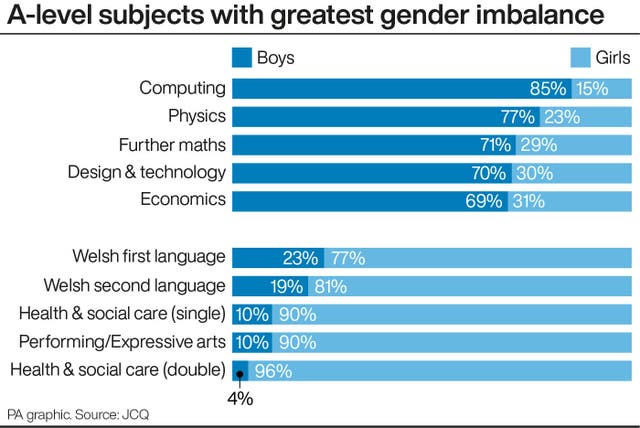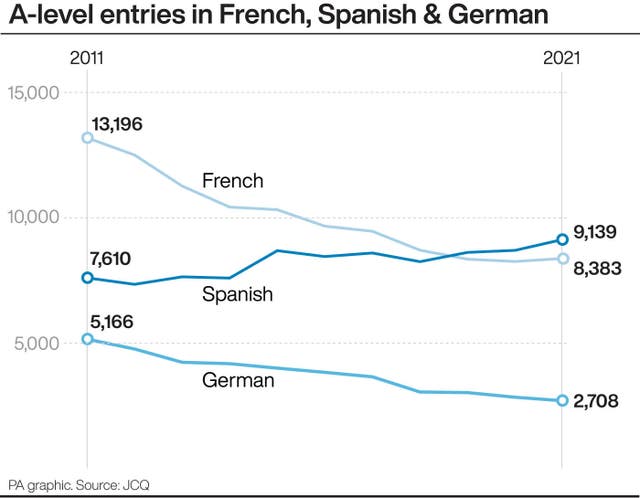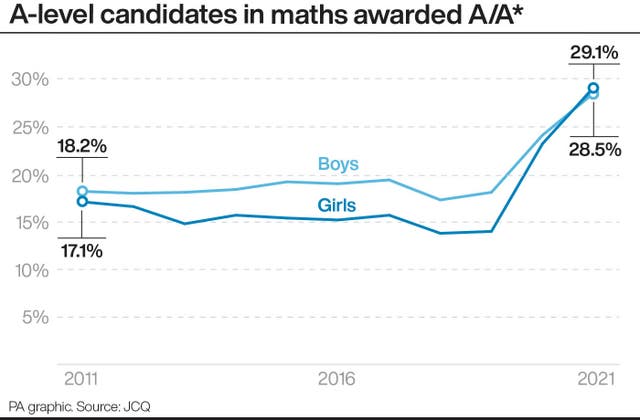The proportion of A-level entries awarded top grades has reached a record high after exams were cancelled, with nearly half achieving an A or above.
Hundreds of thousands of students have been given grades determined by teachers, rather than exams, due to the Covid-19 pandemic.
More than two in five (44.8%) of UK entries were awarded an A or A* grade, up by 6.3 percentage points on last year when 38.5% achieved the top grades.
In 2019, when exams were last run before the pandemic, just one in four (25.5%) of entries achieved the top grades.
Girls performed better than boys at the top grades, and A-level maths female students overtook their male counterparts for the first time in terms of A* grades achieved.
Private schools in England saw the largest absolute increase in the top grades compared with other types of schools and colleges – up 9.3 percentage points on last year, data from Ofqual suggests.
Overall, the proportion of entries awarded the top A* grade this year has surged to 19.1%, compared with 14.3% in 2020 and 7.8% in 2019, figures for England, Wales and Northern Ireland show.
A record number of students have secured a place on their first-choice university course following the bumper year for results.
But youngsters who did not meet their offers are likely to face greater competition for a place at top institutions as there could be fewer courses available in clearing.
Dr Tim Bradshaw, chief executive of the Russell Group, has warned that some courses at the leading universities “may not be able to accept students who narrowly missed their offer grades” this year.
Meanwhile, applicants who have met the conditions of their offers at oversubscribed medical schools have been offered £10,000 if they choose to move medical schools this year amid increased demand.

The figures, published by the Joint Council for Qualifications (JCQ), cover A-level entries from students in England, Wales and Northern Ireland.
In Scotland, the pass rates for Highers and Nationals dropped slightly on last year, but scores were still well above pre-pandemic levels.
This year, teachers in England submitted their decisions on pupils’ grades after drawing on a range of evidence, including mock exams, coursework and in-class assessments using questions by exam boards.
According to an analysis by Ofqual, some 6.9% of students in England – a total of 12,945 students – were awarded three A*s this year, compared with 4.3% in 2020 (7,774) and 1.6% in 2019 (3,007).
Figures show that 70.1% of all A-level entries from private schools were awarded an A grade or higher this year, which has prompted concerns that Covid-19 has widened the gap between private and state schools.
London saw the biggest rise in the proportion of entries awarded A or A* across regions in England, from 40.7% in 2020 to nearly half (47.9%) in 2021.
Meanwhile, north-east England saw the lowest percentage (39.2%) awarded A or A* this year, up from 35.6% last year.

Senior Tory MP Robert Halfon, chair of the Commons Education Committee, warned that grade inflation is “baked” into exam results due to the pandemic.
But Education Secretary Gavin Williamson has defended this year’s results, as he called on people to celebrate young people’s success during a difficult year.
He told ITV’s Good Morning Britain: “These grades are absolutely worth so much, they are the key for those youngsters to take that next step.”
“But we do have to recognise that, as we come out of this pandemic, we will equally have to take steps and take a glide path back to a more normal state of affairs,” Mr Williamson added.
Exam board officials told journalists at a briefing that the higher grades reflected the fact that pupils had “multiple chances” to show their knowledge and they were less likely to have a “bad day” in an exam.

Last summer, the fiasco around grading led to thousands of A-level students having their results downgraded from school estimates by a controversial algorithm before Ofqual announced a U-turn.
This year, no algorithm was used to moderate grades.
Instead, schools and colleges in England were asked to provide samples of student work to exam boards, as well as evidence used to determine the grades for the students selected, as part of quality assurance (QA) checks.
Random and targeted sample checks of evidence were also carried out after grades were submitted.
Congratulations to everyone receiving their A Level and Vocational results today – well done for your hard work this year, of all years.
I hope the whole country will join me in celebrating everything you and your fantastic teachers have achieved.
— Gavin Williamson (@GavinWilliamson) August 10, 2021
Ofqual said that student work from 1,101 centres in England, around one in five schools and colleges, was scrutinised by exam boards.
For 85% of the schools and colleges whose students’ work was scrutinised as part of QA checks, the regulator said the subject experts were satisfied that the evidence supported the teacher-assessed grades that were submitted.
For the remaining 15%, professional discussions took place between teachers and curriculum leads in schools and colleges with external subject experts and, where necessary, centres reviewed and revised their grades.
This represented less than 1% of all the grades issued on Tuesday, according to the exams regulator.

But Ofqual said that, at the time of writing its report, exam boards were in continuing discussions with “a small number of centres” and grades would be withheld for these schools should concerns remain unresolved on results day.
Paul Whiteman, general secretary of the NAHT school leaders’ union, said: “Our advice is to ignore the chat about grade inflation.”
He added: “Students should be confident that they are getting the grades they deserve and that reflect the standard of achievement they have demonstrated.”

Geoff Barton, general secretary of the Association of School and College Leaders (ASCL), said: “It is important to understand that the system used to assess students this year is different from both formal exams and the approach that was used last year too, when an attempt to use an algorithm to standardise grades nationally went wrong and had to be abandoned.
“It is therefore invidious to make direct comparisons with other years and vital that we celebrate the achievements of this year’s cohort who have had to endure so much over the past 18 months.”




Comments: Our rules
We want our comments to be a lively and valuable part of our community - a place where readers can debate and engage with the most important local issues. The ability to comment on our stories is a privilege, not a right, however, and that privilege may be withdrawn if it is abused or misused.
Please report any comments that break our rules.
Read the rules here